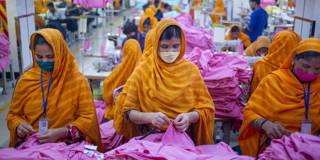By sapping demand for garments and other goods produced in export-oriented developing and emerging economies, the COVID-19 pandemic poses an acute threat to women workers and progress toward greater gender equality. In addressing the economic fallout of the public-health crisis, policymakers must tailor their response accordingly.
PRINCETON/TORONTO – In April, the International Labor Organization predicted that 195 million workers worldwide would “suffer severely” in the second quarter of this year, owing to the economic fallout of the COVID-19 pandemic. And markets remain shaky, raising fears of a recession more severe and prolonged than that following the 2008 financial crisis. The stakes are high for everyone, but particularly for women – and especially for women in developing and emerging economies.

PRINCETON/TORONTO – In April, the International Labor Organization predicted that 195 million workers worldwide would “suffer severely” in the second quarter of this year, owing to the economic fallout of the COVID-19 pandemic. And markets remain shaky, raising fears of a recession more severe and prolonged than that following the 2008 financial crisis. The stakes are high for everyone, but particularly for women – and especially for women in developing and emerging economies.